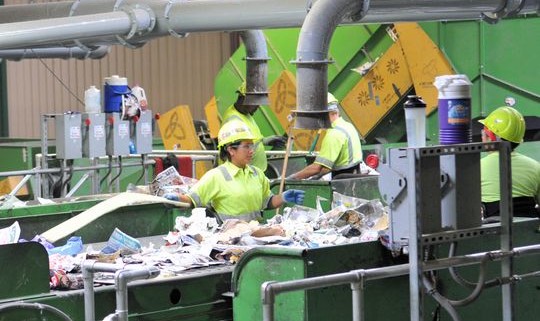Brevard County recycling rate ranks second in Florida
Rick Neale, FLORIDA TODAY1:11 a.m. EST November 7, 2015
COCOA — A plethora of plastic bottles, soda cans, newspapers, cardboard boxes and assorted trash from Palm Bay, Barefoot Bay and Malabar cascaded from the back of Waste Management’s Route 97 truck, piling onto the cement.
Welcome to the “tip floor” of the Single Stream Recyclers plant, the first of its kind on the Space Coast. Raw materials from Brevard County’s residential recycling carts and other sources get dumped here — 6,000 to 7,000 tons per month — for sorting, bundling and shipping for sale around the globe.
On the south side of the tip floor, a tinkling waterfall of broken glass tumbles from a rectangular wall slot, pouring into a sharp-edged heap.
To the north, a yellow Caterpillar loader digs into house-sized mounds of recyclables and dumps them into a large green hopper, where a conveyor belt scoots them inside the facility.
That’s where a noisy network of screening machines, optical scanners, electromagnetic fields and helmeted humans wearing yellow safety vests separates aluminum, paper products and plastics. Like hay from a farmer’s field, a baler compresses these commodities into rectangular blocks that get stacked five-high in the warehouse area, awaiting transport.
“At the end of the day, all of our fiber — which is our paper and our cardboard — is shipped to China. It actually goes to the Rockledge railyard on U.S. 1, goes right from there all the way down to the Port of Miami,” said John Hansen, co-owner of the plant, standing near the baler.
“We ship six to 10 shipping containers a day of the fibers,” Hansen said.
Before SSR opened, Brevard County’s recyclables got trucked to a West Melbourne transfer station for shipment to Orlando or Pembroke Pines, said Amy Boyson, Waste Management community affairs manager.
Instead, SSR processes Brevard’s materials just northeast of Interstate 95 and State Road 520, on Cocoa’s western fringe.
Second-best in Florida
In 2008, the Florida Legislature set an ambitious statewide goal: Recycle 75 percent of materials heading to the landfills by 2020. Brevard County’s recycling rate has increased from 45 percent in 2011-12 to 55 percent last year, said Hillary Arena, county recycling coordinator.
Brevard’s 55 percent rate trails only Martin County (62 percent) among Florida’s 67 counties. Neighboring Orange (51 percent) and Volusia (48 percent) clocked in close behind, while Brevard significantly outpaced bordering Seminole (37 percent), Indian River (32 percent) and Osceola (31 percent).
Arena refers to the Cocoa recycling plant as Brevard’s MRF (pronounced “murf”), or “materials recovery facility.”
SSR is a private company that purchases recyclable materials from Waste Management, various cities and towns, and other sources. Arena said Waste Management trucks in 1,400 to 1,500 tons of materials per month from homes in unincorporated parts of Brevard, and Waste Management pays the county 40 percent of the sale proceeds per a revenue-sharing agreement. From last October through September, the county received $317,658, she said.
To analyze the recycling stream, the county has inked a $20,000 contract with the Florida Institute of Technology’s Office of Research. Students at the Cocoa plant will study contamination and revenue-potential rates of sample loads from various hauling routes across unincorporated Brevard. Results are expected by May.
“They’re analyzing the recycling waste stream so we have an idea of some of those non-recyclables that people are putting into their carts. So we can say, ‘Hey, this is not recyclable. This is not what we want,’” Arena said.
Plant opened last October
Hansen and Eric Konik, a high-school friend, operated hauling businesses during the 1990s in Wisconsin. They teamed up and built a construction materials recycling facility in 2006 in Milwaukee. After selling the enterprise a few years later, Hansen consulted with Waste Management, building recycling facilities across North America.
Waste Management initially planned to open a MRF off State Road 520 just west of the Cocoa Expo Sports Center, but dropped that idea in summer 2013 after neighbors and the Brevard County Planning & Zoning Board objected.
Hansen and Konik contracted to process Waste Management recyclables in Brevard, and they bought 24 acres off the end of Townsend Road in January 2014. After investing about $12 million in the project, according to a Cocoa economic development report, the tan-and-green 63,900-square-foot facility opened on Oct. 20, 2014.
SSR operates Monday through Friday, employing about 70 workers on two shifts. Aluminum and plastics are sold across the Southeast, while glass gets trucked to Sarasota and metals are sold to Cocoa-area recyclers.
Because of tumbling oil prices, Hansen said some commodities are priced at 2008 levels, reducing his revenues.
“With oil prices what they are, everything is a third of what it was a year ago. (Plastic resin) used to be 18 cents a pound. Now, it’s 6 cents a pound,” Hansen said. “We’re making a go at it, but these are as difficult times as they get.”
Plastic bag problems
A scourge of sacks plagues the plant: Plastic throwaway shopping bags wrap around shafts and screens and “really screw up the equipment,” Hansen said.
Inside, workers continually pluck plastic bags from conveyor belts. Outside, bales of plastic bags lined the back of building. Hansen said another bale or two or bags get added every day — and they’ll probably end up in the landfill.
“There’s no market for these right now. There’s probably four or five semi loads worth of plastic bags there,” he said, eyeing the bales.
Last November, Waste Management launched a “Recycle Often, Recycle Right” educational campaign advising residents to take plastic bags to a participating retail store for recycling, not to their curbside bin.
“People pick up after their dogs with plastic bags and put it in the recycle bin. You have human beings taking this stuff out,” Boyson said.
Last month, the Brevard County Commission unanimously approved a resolution that would empower counties and cities to regulate plastic carry-out shopping bags.
‘Recycled’ hand grenade
Inside his office, Hansen displays a hand grenade — which fortunately lacked an explosive charge — alongside a tie-rod end and drill auger as examples of oddball metal items that entered his plant. People have also discarded engine blocks and auto wheels.
“We handle about 300 to 350 tons a day of material. Trucks come in every day, no matter what. The collection trucks don’t stop. When we have something drop into our glass breaker and break a timing belt, we’re down for an hour and a half or longer — or whatever it takes to get it out,” Hansen said.
Worse, people attempt to recycle propane tanks. Small propane cylinders used for camping or grilling pose additional problems, because they can traverse the plant camouflaged amid other materials before blowing up in the baler.
“We used to have probably three or four explosions a month. It would shake the building. It was crazy. We had to add another person just for that, and that’s all they do,” he said.
Hansen said his propane-tank spotter typically removes one every four to five minutes.
On the biological side, he said some people attempt to recycle dangerous wastes — “the number of hypodermic needles and dirty diapers is unbelievable.”
Boyson said other recycling no-no’s include hoses, shredded paper, hangers and clothing. As a rule of thumb, she said plastic containers can be recycled if they have a neck, like a Gatorade bottle or a laundry detergent bottle.
“Get back to the basics. Just recycle your mail, your newspaper, your plastic bottles, your aluminum cans. Stop over-thinking it,” she said.





